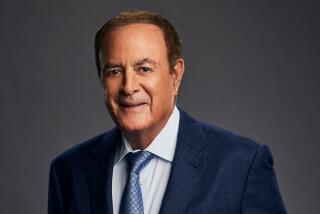Maher dives into Amazon’s ‘Fishbowl’
Seated on a sofa in his mid-Wilshire office, politically driven comedian Bill Maher luxuriated over a newspaper, demonstrating the ink-on-fingers pleasure of reading a tangible news source versus perusing it online. His quaint reverence for classic media notwithstanding, Maher mused, “I was never [a total Luddite], but I’m not leading the parade on technology.”
Those are perhaps modest words from a man who will spearhead part of the second swell of online television programming when he launches his new talk show, “Amazon Fishbowl With Bill Maher.” The half-hour program’s live debut airs Thursday at 8 p.m. on the website of online retailer Amazon.com.
Maher first connected with the company -- best known for its book sales -- last July when he performed in its 10th anniversary show, which streamed live on its site. He is now slotted for 12 Thursday-night episodes of Amazon’s first online talk show during the period when his popular one-hour HBO show “Real Time With Bill Maher” is on hiatus.
Adhering to a traditional entertainment talk show format, “Fishbowl” will likely offer him a welcome sabbatical from his cable program, which presents the weekly challenge of a live, politically oriented talk show peppered with the entertainer’s signature from-the-hip comedic style.
For “Real Time,” Maher must, as he puts is, “be able to converse intelligently with a senator and then go into a comedy routine.” It takes an agility not every host can master.
The lighter Amazon format, however, would place the eclectic performer in the ring with mainstream talk show hosts. Maher good-naturedly joked, “I would just like to put [Jay Leno and David Letterman] on alert that if I wanted to do that kind of a show, it’s a lot easier than the show I do.”
Apart from incendiary subject matter and guests waxing impromptu, Maher explained that “Real Time” has had its share of difficulties securing conservative panelists willing to defend the president against the decidedly liberal leanings of its host. He added, “It’s a scary show for a lot of people.”
“Fishbowl,” on the other hand, promises a kinder, gentler talk show. Amazon, not Maher, will book the guests -- authors, directors, actors and musicians possibly more inclined to heatedly discuss creativity than creationism. Guests for the premiere will include author Dean Koontz, the Dixie Chicks and Ludacris.
The show’s focus may veer toward less urgent matters, but the very nature of an online talk show featuring a celebrity host is a pretty hot topic these days. “Right now, broadcast television and broadband are distinct mediums ... but that is quickly converging,” said Marcia Zellers, director of the American Film Institute Digital Content Lab, who created some of the earliest Internet television programming and portals at MTV Interactive and Warner Bros. online in the ‘90s. This was the time of the first wave of online television, an experiment that fell short due to “bad buffering” and screens “the size of a postage stamp.”
Internet TV’s current Nouvelle Vague appears to be a totally different story. This is thanks in large part to a thriving online economy minus the lavish over-expenditures of the dot-com bubble. In the age of sated media-savvy consumers, businesses like Amazon.com are trying to find more sophisticated, subtler way to pique interest in their wares. “How do you advertise to people who no longer need to sit through commercials, who don’t want to watch your TV show when you’re airing it?” Maher asked rhetorically.
Amazon is betting “Fishbowl” is the answer. Online viewers will watch a comedy monologue by Maher, his three interviews with artists, a live musical performance and a regular UPS-sponsored mini-segment in which such personalities as comedian Paul Reiser show up unexpectedly at Amazon.com customers’ homes to deliver their orders. There may also be an interactive element with the show, Amazon spokesman Andrew Herdener suggested, without offering details. Certainly, products related to the show’s guests -- their books or CDs, say -- will be made available for purchase while the show streams. This online blend of entertainment and advertising seems ideally poised to get some attention, especially in the TiVo era -- a consumer-customized commercial-free epoch of surfing and zapping. Maher himself admits: “I tend not to watch commercials. I tend to zip through them.”
As of February, 68% of active Internet users in U.S. homes had broadband connections. “Video over broadband is a pretty good experience these days,” Zellers said. The net presence of big TV names like Maher’s and that of producer Mark Burnett -- who has inked an online reality show deal with AOL -- is also a significant indicator of the zeitgeist.
On the World Wide Web and in its budding Internet TV branch everything is, naturally, connected. AOL, a division of Time Warner Inc., HBO’s parent company, is already offering online fans a chance to sample original snippets based on the “New Rules” segment from “Real Time.” In it, Maher comes up with his own set of humorous laws based on topical jokes. On a recent webcast, he proclaimed: “New rule: Someone has to tell TV executives that Orange County isn’t really that interesting.” The AOL site-exclusive feature also provides surfers with so-called “video snacks” of “New Rules,” bite-sized online or mobile phone footage of no more than 10 minutes. This new hybrid culture of TV and Internet may well alter the way viewers experience time. “Fishbowl” may be perceived by TV “couch potatoes” as relatively short. Internet “desk potatoes” may experience it as lengthy. It remains, of course, to be seen as to how much time will matter to viewers versus content.
Maher, always eager to give a topic a political context, expressed hope that today’s attention-challenged Americans might readapt to digesting more information. He cited Iraq as an example of a complicated situation that “cannot be explained in 30 seconds.”
In one of this season’s “Real Time” episodes, he defended the alleged long-windedness of guest Sen. Joseph R. Biden Jr. (D-Del.), siding with thoroughness over “bumper sticker” wisdom. Referring to that episode, Maher issued a warning: “In 30 years [people] might find that they wish way back in 2006 that they had paid a little closer attention to someone who was giving a long answer.”
Fans of “Real Time” have come to expect such musings from the edgy host. But how might the demographically broader Amazon audience react to a show that is not about politics but is hosted by an entertainer whose political bent is so widely known? “I can’t hide being me and I don’t want to,” Maher said.
“We’re not talking about this small niche audience,” Herdener added. Liberals and conservatives, young and old, make up the online retailer’s database of 55 million shoppers, he said. That’s 26 million more than a recent tabulation of HBO’s subscribers.
But Maher sees common ground between the two: “I think the HBO audience and the Amazon audience are very similar ... both are a little more erudite.”
Though Hollywood may be fond of surefire formulas and maps, Internet TV’s territory is something akin to the Wild West at the moment. “No one has the answer and everyone’s trying to figure that stuff out,” Zellers said. No one can predict, for instance, if the familiar live TV format that Amazon.com is adopting for “Fishbowl” will translate in cyberspace. “I hope [being live] adds a little sense of danger and immediacy,” said Maher, who prefers the uninterrupted format to pre-taping.
“I would not be surprised in five years if Amazon was a network,” projected Maher. In fact, “Real Time” producer Billy Martin appears to be previewing that terrain as well, as he joins Maher as executive producer on “Fishbowl.” Maher posited that perhaps in 10 years, “... what we conceive of as a network no longer exists because people don’t really watch any shows on television at a certain appointed time.”
More to Read
The complete guide to home viewing
Get Screen Gab for everything about the TV shows and streaming movies everyone’s talking about.
You may occasionally receive promotional content from the Los Angeles Times.






